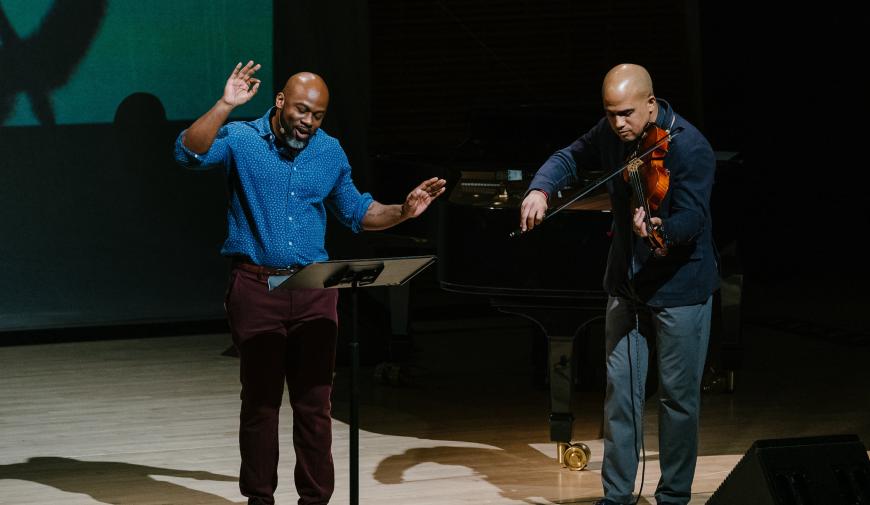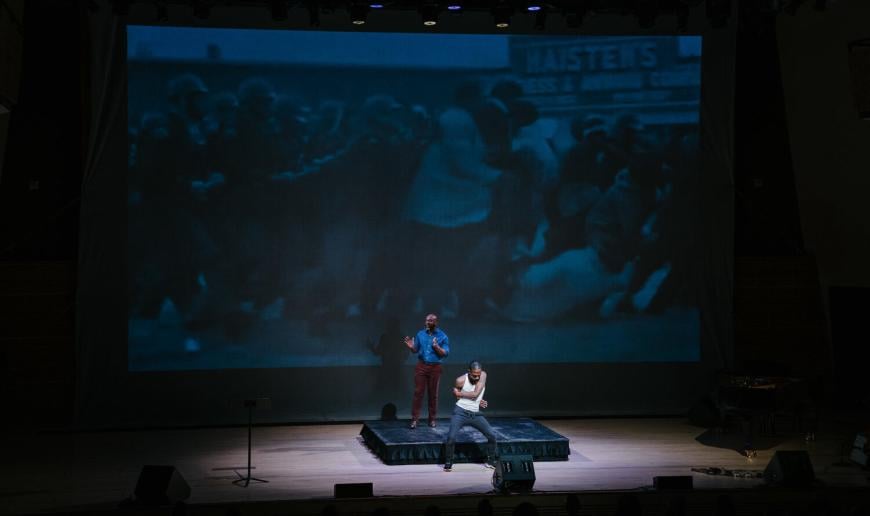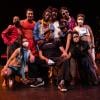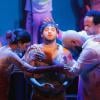
Before Friday’s performance of The Just and the Blind at The Ford, Mustafa’s single “Air Forces” drifted almost unnoticed from speakers across the amphitheater’s gently lit entrance steps. Backgrounding the conversations of early arrivers sitting across the venue’s layered patios, the song’s opening lyrics were a potent foreshadowing of themes to come:
“Don’t crease your air forces / Just stay inside tonight / You know what’s happening outside / You say it’s OK / But you tucked your chain / Like if they take it / I won’t see you for a while.”
Like “Air Forces,” The Just and the Blind is a work that concerns itself with Black love while looking unflinchingly at the ways in which racism — interjecting itself — can introduce tragic complications. The music-theater piece, produced by creative management company SOZO Artists, was conceived and written by spoken-word poet Marc Bamuthi Joseph, with a score by longtime collaborator and composer Daniel Bernard Roumain.
The pair — Joseph delivering spoken word and freestyle rap, Roumain playing a combination of electric violins, piano, and electronics — were joined at The Ford by dancer Drew Dollaz and singer Nia Andrews. The quartet wove a robust, layered tapestry across an array of media.
The Just and the Blind is unflinching in its appraisal of systemic racism and the white gaze. But the moments of greatest poignancy in this performance were those in which Joseph’s verse, Roumain’s music, and Dollaz’s movement spoke to the complicated interior experience of Black masculine identity — the inherently human joy and the deeply internalized self-hatred that are a part of reckoning with that self-perception.
The project is anchored by its storytelling. Joseph’s speech is interspersed with the recorded voices of four men of color — Nick Jasso, Areli Ceja, Angel Ramos, and Sam Navas — taken from interviews recorded for Fresh Lifelines for Youth (FLY), a San Francisco Bay Area nonprofit. The show’s many elements grow out of these narrators’ memories — some hopeful, some heartbroken.
Most striking among the vocal examples on Friday were the recorded interviews. Searing recollections — of the inside of a jail cell after an arrest, of parental advice received in the wake of a family tragedy — demanded rapt focus from the otherwise vocal audience. (The interviewees’ striking words deserved more detailed attribution in the evening’s program notes.)
Joseph, an able and charismatic master of ceremonies, echoed these themes in his own analytical, autobiographical storytelling. There was youthful swagger in his piece about a risky night smoking in Ghana, fear in his stories about his own senseless arrest, and a tortured admission of self-hatred (“We see and are afraid of ourselves as Black men”).
His delivery — which oscillated between a brilliantly inflected speech cadence and flurries of propulsive freestyle rhythms — demonstrated his well-cultured sense of pacing and phrasing. But the virtuosity of his couplets sometimes eclipsed the thematic content of his anecdotes, swelling with heat atop Roumain’s scoring.

Roumain accented the relaxed production, reminiscent of the early work of songwriter and producer Sounwave, with musical language from several genres. At the keys, the composer channeled jazz and soul in plainly voiced chords, which supported the tender ornamentation in Andrews’s vocals.
Roumain alternated between two electric violins onstage. The first’s plucked and percussive attacks, when filtered through an array of pedals, echoed the pitchless accents of a funk rhythm guitar. The other, transposed to mimic a cello’s range, carried the heft of a bluesy bass. Both these live-played interjections of groove gave the tracks needed personality but could have been mixed more assertively.
When the music was the focus, Roumain flitted precociously through jazz-inflected countermelodies, adjusting his vibrato judiciously to match the swells of emotion in the narrators’ voices. Toward the show’s conclusion, he transformed his violin’s tone into that of an electric guitar a la Jimi Hendrix, Roumain swinging his bow boldly in his hand to whoops from the crowd before launching into a barn-burning minutes-long solo interlude.
The multifaceted production sometimes crowded Dollaz’s distinctive performance. While he danced on a raised platform center stage, Joseph meanwhile too often drew visual focus by pacing across the forestage. But Dollaz shone when his work was given space. His flexing-inflected language, lithe and limbic, was hypnotic when spotlit, often during interjections from FLY interviewees.
And in the last movement, Dollaz retook the stage in pointe shoes, delivering a tender closing piece as projections from filmmakers Yoram Savion and Benjamin Tarquin rotated slowly against the textured hills behind the stage. It was an ending note that could have been cloying but felt hopeful instead.




